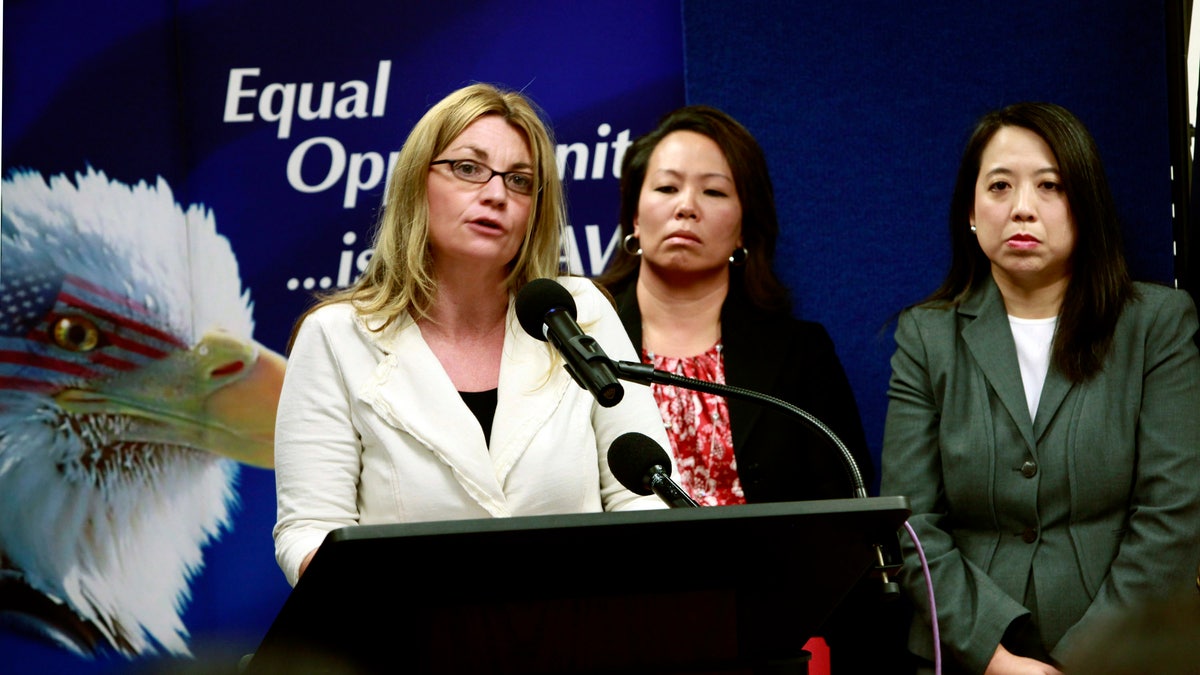
April 20: Kay Buck, left, executive director of the Coalition to Abolish Slavery Trafficking, speaks at a news conference to announce the filing of a human trafficking lawsuit that stretches across California , Hawaii, and Washington. Anna Park, regional attorney for the EEOC in the Los Angeles District, center, and Chanchanit Martorell, executive director for the Thai Community Development Center, listens in. (AP) (AP2011)
LOS ANGELES – A federal agency has filed lawsuits claiming Thai workers were physically abused and forced to live in rat-infested housing after being recruited by a California-based labor contractor to work on farms in Hawaii and Washington.
The U.S. Equal Employment Opportunity Commission said it was the largest human trafficking case to date pursued by the agency against the agriculture industry.
The two lawsuits were filed Tuesday in Washington state and Hawaii against Beverly Hills-based Global Horizons Inc. along with six farms in Hawaii and two in Washington.
"Global subjected the claimants to uninhabitable housing, insufficient food and kitchen facilities, inadequate pay, significant gaps in work, visa and certification violations, suspension, deportation, and/or physical violence," the lawsuit states.
Global Horizons lured Thai workers to the U.S. between 2003 and 2007 with promises of steady jobs and agricultural visas, then confiscated their passports and threatened to deport them if they complained about conditions, commission officials said.
The workers lived in dilapidated, rat-infested rooms -- where many didn't have beds -- and were often threatened and physically abused in the fields. They also were isolated from non-Thai workers, who were believed to work under different conditions, officials said.
"Once they arrived here in the United States, the story of discrimination began," Anna Park, regional attorney for the EEOC in Los Angeles, said Wednesday at a news conference announcing the legal action.
Global Horizons could not be immediately reached for comment because the phone numbers listed on its website were not working.
The EEOC is seeking back pay and up to $300,000 in damages for each of the workers. Attorneys said they could not estimate how much was owed in wages and expected the number of workers in the case would increase.
Global Horizons recruited Thai workers under the federal government's agricultural guest worker program, known as H-2A. The company subjected workers to intolerable conditions, while the farms turned a blind eye or failed to know about the practices of the contractor, the lawsuits state.
Chanchanit Martorell, executive director of the Thai Community Development Center, said her organization received its first report of abuse from a worker who escaped from a farm in Hawaii in 2003.
More workers came forward with similar claims about different farms that contracted with Global Horizons in different states, she said.
Workers said they had undertaken exorbitant debts in Thailand, with many using their family's land as collateral to guarantee recruitment fees they had to pay in the U.S.
Many workers were not given the jobs or wages they were promised and were forced to endure threats and abuse, Martorell said.
On one Hawaiian farm, workers were so hungry they ate the leaves of plants behind an abandoned schoolhouse where they slept, she said. Workers also were housed in a freight container, where wooden shelves were used as beds, she said.
Martorell said her organization helped workers file claims with the EEOC and secure a special visa intended for trafficking victims. About 1,100 Thai workers were brought into the country by Global Horizons, she said.
Attorney Clare Hanusz, who represents nearly 100 Thai laborers who claim discrimination, said the workers had to wait until now for action after making complaints about conditions that occurred years ago.
"It seems like now the EEOC is playing catch-up," Hanusz said. "The way they're going about it, I don't really understand. But I'm glad they're doing something."
Six Global Horizons recruiters and two Thai labor recruiters were previously indicted in federal court in Hawaii on charges of luring 600 workers from Thailand with promises of lucrative jobs before confiscating their passports and failing to honor their labor contracts.
The indictment said workers paid between $9,000 and $26,500 in recruitment fees and worked in a number of states, including Mississippi and Utah.
Supervisors threatened to send the workers back to Thailand when they complained about a lack of work and poor living conditions, knowing many would be afraid to return because of the substantial debts incurred to finance the trip, court papers said.
Defendants cited in the latest EEOC's lawsuits include Captain Cook Coffee Co., Del Monte Fresh Produce, Kauai Coffee Co., Kelena Farms Inc., Mac Farms of Hawaii and Maui Pineapple Co., all in Hawaii, along with Valley Fruit Orchards of Washington state and Green Acre Farms of Washington.
Messages left at three of the Hawaii farms seeking comment were not immediately returned. Del Monte said it would have a statement later in the day. Captain Cook Coffee Co. said it had not yet reviewed the suit. It was not immediately possible to reach Kelena Farms. John Verbrugge of Valley Fruit and Jim Morford of Green Acre Farms did not immediately return telephone messages.
Also on Wednesday, the EEOC announced it had filed a lawsuit in Mississippi against marine services company Signal International alleging 500 Indian welders and pipe-fitters faced discrimination and substandard living conditions in Mississippi and Texas. Signal officials declined to comment on pending litigation.
Both suits come amid a push at the EEOC to focus on human trafficking cases.

